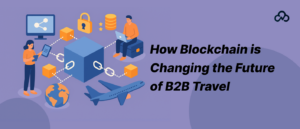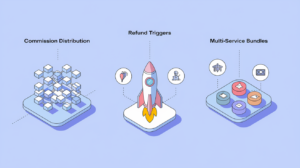Introduction

If you’ve ever worked behind the scenes in B2B travel, handling supplier contracts, chasing down payments, or untangling commission disputes, you already know the truth: the system is overdue for a serious upgrade. For years, b2b travel companies have leaned on legacy tech that was built for a different era. Global distribution systems (GDS), manual reconciliation, siloed inventory, you name it. All of it slows down deals, costs more than it should, and leaves far too much room for miscommunication.
Enter blockchain.
Not just another shiny buzzword, but a foundational technology that’s finally getting traction where it matters: in the guts of the travel supply chain. What makes blockchain different? It offers something this industry has long needed, automation with transparency, and security without complexity.
Now, b2b travel companies are beginning to realize that blockchain isn’t about disruption for the sake of headlines. It’s about making everyday operations smoother, faster, and harder to break. Whether it’s settling payments instantly or cutting out intermediaries entirely, the technology is reshaping how partners connect, share data, and build trust.
Why b2b travel companies Are Turning to Blockchain Right Now
Let’s not pretend this shift came out of nowhere. The pressure has been building for a while.
Delayed settlements, confusing commission structures, and manual disputes between partners, these are not rare exceptions. They’re baked into the workflow for most b2b travel companies, especially when you’re dealing with multi-leg bookings or cross-border partnerships.
Now multiply that by dozens of suppliers, destinations, and time zones, and it’s easy to see why blockchain is suddenly so attractive.
Here’s what blockchain offers to b2b travel companies struggling with outdated systems:
-
Automatic reconciliation with zero ambiguity
-
Smart contracts that enforce terms without human involvement
-
Real-time visibility into transactions across the network
-
Immutable records for compliance and auditing
Data point: According to Deloitte’s 2023 travel report, early blockchain adopters in B2B travel saw an 18% reduction in operational costs in the first 12 months.
And it’s not just large OTAs or global DMCs. Mid-sized tour operators, hotel consolidators, and even regional platforms are starting to experiment, often in partnership with a travel software development company that understands how to integrate blockchain with minimal disruption.
What was once considered “experimental” is quickly becoming an industry standard-in-the-making.
Decentralized Booking: Less Hype, More Function
Here’s a concept that’s finally getting its due: decentralized booking.
For years, inventory has flowed through centralized networks like GDSs. They worked, mostly, but at a cost: slower updates, limited transparency, and expensive intermediaries. Blockchain offers a compelling alternative, and many b2b travel companies are starting to take it seriously.
With decentralized booking, hotels, suppliers, and platforms connect directly over a blockchain ledger. There’s no central authority, just a peer-to-peer network where every booking is verified, logged, and instantly visible to authorized parties.
Let’s say a boutique hotel in Vietnam wants to distribute rooms to 15 partners. Instead of juggling emails, PDFs, or middle layers, it can push its availability to a blockchain network. Each authorized b2b travel company can see live inventory and book it directly. The smart contract handles pricing, terms, and availability logic in real time.
This changes everything:
-
Inventory updates are instant, not batch-synced
-
Overbookings become nearly impossible
-
Commissions are pre-agreed and auto-settled
-
Cancellations and refunds follow predefined rules, with no back-and-forth
Real-world impact: One B2B platform testing decentralized hotel booking reduced booking errors by 70% and eliminated reconciliation calls between partners altogether.
And while GDSs aren’t disappearing tomorrow, b2b travel companies can’t ignore this shift. Those working with a blockchain-savvy travel software development company today will be first in line when decentralized booking goes mainstream.
Travel Smart Contracts: Agreements That Execute
Themselves

If there’s one blockchain feature that could truly streamline operations for b2b travel companies, it’s the smart contract.
A travel smart contract is essentially a programmable agreement: if condition A is met, action B is automatically executed, no back-and-forth emails, no missed steps. And in an industry where bookings, commissions, refunds, and cancellations happen across multiple parties, automation is a game-changer.
Here’s how b2b travel companies are already using smart contracts:
-
Commission distribution: When a booking is confirmed, the correct commission is instantly allocated to each party involved.
-
Refund triggers: If a flight is canceled or a hotel stay is cut short, a refund is automatically issued based on preset terms.
-
Multi-service bundles: Flights, transfers, accommodations, and insurance are bundled in a single contract, with every clause executed transparently.
Mini Case: A mid-sized European DMC worked with a travel software development company to roll out Ethereum-based smart contracts across its supplier network. In the first quarter, processing time for multi-party bookings dropped from three days to under three hours.
What used to be slow and error-prone is now nearly instantaneous, and verifiable. Every transaction, every adjustment, every payout is logged on a blockchain ledger that everyone involved can access. No arguments. No surprises.
The Role of Travel Technology Providers in the Shift
Of course, adopting blockchain isn’t as simple as flipping a switch. That’s why travel software development companies are stepping up, helping businesses modernize their infrastructure without overhauling everything at once.
Today’s blockchain-ready travel technology platforms focus on modular integration. That means b2b travel companies can plug in features like smart contract automation, decentralized booking access, or loyalty tokenization, without rewriting core systems.
Some key technologies being rolled out include:
-
Digital identity verification for secure traveler and supplier onboarding.
-
Blockchain-backed APIs for secure, real-time supplier communication.
-
Tokenized rewards systems, where loyalty points become tradable digital assets.
Startups in the travel technology space are moving quickly. But even larger enterprise players are now exploring partnerships with blockchain-savvy vendors, recognizing that agility is key in a shifting market.
Technical FAQs
Q1: How does blockchain improve payment workflows for b2b travel companies?
Traditional payment pipelines involve banks, GDSs, and back-office teams. Blockchain simplifies this through smart contracts, reducing time from days to minutes, while keeping every step transparent and secure.
Q2: Are travel smart contracts safe and legally binding?
Smart contracts are secure by design. While regulatory frameworks are still evolving, many b2b travel companies use them for B2B automation, where binding enforcement depends more on business reputation than court systems.
Q3: Can blockchain scale for high-volume B2B platforms?
Yes, especially with newer blockchains built for performance. Networks like Solana and Layer 2 Ethereum solutions offer the speed and cost-efficiency needed for real-time B2B travel environments.
Q4: Can a travel software development company help implement blockchain without full system replacement?
Absolutely. Most providers now offer modular blockchain services. Think: smart contracts for commission, decentralized booking layers, or token integration, all without touching legacy booking engines.
What’s Holding Blockchain Back in B2B Travel?
For all its potential, blockchain adoption still faces a few hurdles, especially in traditional sectors like travel.
-
Complexity: Blockchain isn’t always easy to explain or integrate, especially for non-technical teams.
-
Regulatory fog: Cross-border transactions, data storage, and token usage vary by country.
-
Vendor lock-in concerns: Not all systems play well together, and blockchain adds another layer to manage.
-
Cultural resistance: Many established b2b travel companies prefer sticking with what works, even if it’s inefficient.
Still, these challenges are temporary. As more travel software development companies create user-friendly tools and governments establish clearer frameworks, the learning curve will flatten, and adoption will accelerate.
What’s Next: B2B Travel on a Decentralized Backbone
Here’s what the next five years could look like:
-
Stablecoin settlements become the norm for international agency-to-supplier payments.
-
Open blockchain APIs replace proprietary inventory channels.
-
Smart contracts handle everything from group travel bookings to event cancellation clauses.
-
Decentralized booking systems challenge GDS dominance, especially in regions with weak infrastructure.
Projection: According to Skift Research, by 2030, nearly 40% of b2b travel companies will use at least one blockchain-powered tool as part of their core operation.
In short, the industry is not just watching blockchain grow, it’s preparing to build on it.
Time to Build Smarter, Not Bigger

Blockchain isn’t hype anymore, it’s infrastructure. For b2b travel companies, this isn’t just about innovation. It’s about survival in a market that demands speed, transparency, and trust at scale.
With decentralized booking, travel smart contracts, and modern APIs now available, there’s no reason to remain stuck in outdated systems. If you’re already working with a travel software development company, now’s the time to ask what’s possible, and how to phase it in without disruption.
Because while the tools are getting smarter, so is the competition. The future of b2b travel companies belongs to those who are willing to rewire their operations, not just for efficiency, but for resilience.
Do you like to read more educational content? Read our blogs at Cloudastra Technologies or contact us for business enquiry at Cloudastra Contact Us